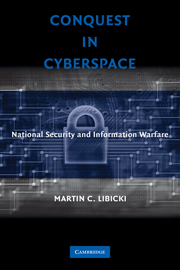Book contents
- Frontmatter
- Contents
- List of Figures
- Acknowledgments
- 1 Introduction
- 2 Hostile Conquest as Information Warfare
- 3 Information Warfare as Noise
- 4 Can Information Warfare Be Strategic?
- 5 Information Warfare Against Command and Control
- 6 Friendly Conquest in Cyberspace
- 7 Friendly Conquest Using Global Systems
- 8 Retail Conquest in Cyberspace
- 9 From Intimacy, Vulnerability
- 10 Talking Conquest in Cyberspace
- 11 Managing Conquest in Cyberspace
- Appendix A Why Cyberspace Is Likely to Gain Consequence
- Index
4 - Can Information Warfare Be Strategic?
Published online by Cambridge University Press: 05 June 2012
- Frontmatter
- Contents
- List of Figures
- Acknowledgments
- 1 Introduction
- 2 Hostile Conquest as Information Warfare
- 3 Information Warfare as Noise
- 4 Can Information Warfare Be Strategic?
- 5 Information Warfare Against Command and Control
- 6 Friendly Conquest in Cyberspace
- 7 Friendly Conquest Using Global Systems
- 8 Retail Conquest in Cyberspace
- 9 From Intimacy, Vulnerability
- 10 Talking Conquest in Cyberspace
- 11 Managing Conquest in Cyberspace
- Appendix A Why Cyberspace Is Likely to Gain Consequence
- Index
Summary
Computer hacking exists and its effects are not always trivial. Writers of viruses and worms can also annoy a great number of people. Authors of similar malware have succeeded in collectively turning millions of computers into zombies, programmed to spam Web sites or mailboxes on command. Hackers have stolen such personal information as credit-card or social security numbers from feckless owners of databases. Intelligence agencies have registered a fair amount of success trolling in files and pulling out interesting albeit generally random pieces of information. Indeed, one can state with a great deal of confidence that any information system connected to the Internet that gives access to enough trusted people, such as employees, can be tricked into giving the same access to a hacker; it only takes one sloppy user to open the door inadvertently. As long as hackers are not terribly fussy about who they annoy, whose machine they take over, or whose identity they acquire, they can always find some weak links out there.
All this, though, remains a far cry from getting a specific system to do what you want it to do, which is the sine qua non of using information warfare for strategic effect. Granted, the ability to exacerbate the usual chaos in an adversary's economy or military can be advantageous only if used sparingly and wisely. But if that were all one could expect from information warfare, it would hardly rate the attention it has received both in the press and in the Pentagon.
- Type
- Chapter
- Information
- Conquest in CyberspaceNational Security and Information Warfare, pp. 73 - 101Publisher: Cambridge University PressPrint publication year: 2007



